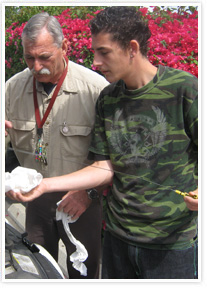Learn more about Urban Skills Center on Facebook
School is the best place to learn
We believe that the best place to teach skills, academic or vocational skills, is in school. School is where students can learn the parts of a task without having to complete the whole task. School is where the skill to perform complex tasks can be built up over time. School is where students can fail and be corrected. School is where relevant skills can be practiced again and again until they are mastered. But, school cannot accomplish all that is necessary to lead a student to become a quality employee performing a skilled task. To do this, some amount of training on real jobs is necessary.
Apprenticeships for a successful transition to work
Urban Skills Center’s view is that the best way to accomplish on-the-job training is to provide our students with a number of apprenticeships over time. This way, they can practice what they have learned in school in a variety of employment settings, each with different tasks and requirements. Moreover, such apprenticeships permit our students to move from more intensive supervision to less supervision, from comparatively little independence to the nearly total independence that is required of competitive employment. Many of these skills are transferable across vocational settings, including paid employment, and this is highly desirable because it means that there are efficiencies in the training we provide both in school and on the job.

Animal care is a rewarding vocational skill
Urban Skills Center’s Vocational Education Services teaches generalized vocational skills which are then applied to specific vocational areas. Students are trained and receive feedback daily on several “general task strategies,” including how to start a job, perform a task, check work, ask for more work, and how to clean up the area at the end of the work period.
These general task strategies are applied to a wide range of tasks that can lead to many different employment opportunities for our students, including animal care, basic vehicle maintenance (e.g., checking fluids, tire pressure, cleaning), general office cleaning (e.g., vacuuming, dusting, emptying trash, washing windows), clerical service (e.g., labeling, copying, filing, assembling materials, data entry), craft and product assembly, deliveries, food packaging and service, library service (e.g., returning books to shelves, data entry, fixing materials), store clerking, and
yard maintenance (e.g., trimming, raking, weeding, bagging).
Getting a job and keeping a job
Students are trained in career exploration and how to participate in and make a good impression at job fairs. Urban Skills Center students also learn how to apply and interview for a job; including filling out applications, writing cover letters; how to dress for the interview, how to introduce him/herself; and thank you letters. Heavy emphasis is placed on social skills related to job environments, so students
are trained in accepting feedback, following directions, having friendly interactions, and problem solving appropriately
A Portfolio of information
Each Urban Skills Center student creates an employment-training portfolio, which includes a resume, relevant personal information, copies of important documents, letters of recommendation, vocationally-relevant assessments, job training checkouts, and other evaluations. In addition, our more advanced students are given opportunities to mentor their peers and to train them in a variety of occupational skills.




